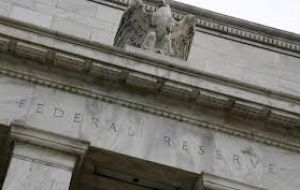MercoPress. South Atlantic News Agency
Federal Reserve cautious about the future, leaves interest rates unchanged
 “The pace of improvement in the labor market has slowed” However “economic activity will expand at a moderate pace”
“The pace of improvement in the labor market has slowed” However “economic activity will expand at a moderate pace”  Inflation has continued to run below the Committee's 2% longer-run objective, partly reflecting earlier declines in energy prices and non-energy imports prices
Inflation has continued to run below the Committee's 2% longer-run objective, partly reflecting earlier declines in energy prices and non-energy imports prices  Policymakers have been worried about potential weakness in the U.S. labor market and the possibility of financial turmoil if UK votes next week to leave the EU
Policymakers have been worried about potential weakness in the U.S. labor market and the possibility of financial turmoil if UK votes next week to leave the EU  The Fed raised rates in December for the first time in nearly a decade and signaled four increases were likely in 2016.
The Fed raised rates in December for the first time in nearly a decade and signaled four increases were likely in 2016.  The stance of monetary policy remains accommodative, thereby supporting further improvement in labor market conditions and a return to 2 percent inflation.
The stance of monetary policy remains accommodative, thereby supporting further improvement in labor market conditions and a return to 2 percent inflation. United States Federal Reserve in a unanimous vote kept interest rates unchanged on Wednesday and signaled that it will assess labor market conditions, inflation expectations and financial and international developments before deciding on future actions. The U.S. central bank also lowered its economic growth forecasts for 2016 and 2017 and indicated it would be less aggressive in tightening monetary policy after the end of this year.
“The pace of improvement in the labor market has slowed,” the Fed said in a statement. It added, however, that “economic activity will expand at a moderate pace and labor market indicators will strengthen” even with gradual rate increases.
Policymakers have been worried about potential weakness in the U.S. labor market and the possibility of financial turmoil if Britain votes next week to leave the European Union. The Fed statement on Wednesday made no reference to that vote.
The Fed raised rates in December for the first time in nearly a decade and signaled four increases were likely in 2016. Concerns about a global economic slowdown and volatility in financial markets subsequently reduced that number to two.
Although worries about the health of the global economy have eased, a sharp slowdown in U.S. hiring in May was unsettling. More recent data have indicated that jobs report may have been a blip. The Fed statement said economic activity appeared to have picked up since April. FOMC (Federal Open Market Committee) is scheduled to meet again at the end of July.
Follows FOMC release:
Information received since the Federal Open Market Committee met in April indicates that the pace of improvement in the labor market has slowed while growth in economic activity appears to have picked up. Although the unemployment rate has declined, job gains have diminished. Growth in household spending has strengthened. Since the beginning of the year, the housing sector has continued to improve and the drag from net exports appears to have lessened, but business fixed investment has been soft. Inflation has continued to run below the Committee's 2 percent longer-run objective, partly reflecting earlier declines in energy prices and in prices of non-energy imports. Market-based measures of inflation compensation declined; most survey-based measures of longer-term inflation expectations are little changed, on balance, in recent months.
Consistent with its statutory mandate, the Committee seeks to foster maximum employment and price stability. The Committee currently expects that, with gradual adjustments in the stance of monetary policy, economic activity will expand at a moderate pace and labor market indicators will strengthen. Inflation is expected to remain low in the near term, in part because of earlier declines in energy prices, but to rise to 2 percent over the medium term as the transitory effects of past declines in energy and import prices dissipate and the labor market strengthens further. The Committee continues to closely monitor inflation indicators and global economic and financial developments.
Against this backdrop, the Committee decided to maintain the target range for the federal funds rate at 1/4 to 1/2 percent. The stance of monetary policy remains accommodative, thereby supporting further improvement in labor market conditions and a return to 2 percent inflation.
In determining the timing and size of future adjustments to the target range for the federal funds rate, the Committee will assess realized and expected economic conditions relative to its objectives of maximum employment and 2 percent inflation. This assessment will take into account a wide range of information, including measures of labor market conditions, indicators of inflation pressures and inflation expectations, and readings on financial and international developments. In light of the current shortfall of inflation from 2 percent, the Committee will carefully monitor actual and expected progress toward its inflation goal. The Committee expects that economic conditions will evolve in a manner that will warrant only gradual increases in the federal funds rate; the federal funds rate is likely to remain, for some time, below levels that are expected to prevail in the longer run. However, the actual path of the federal funds rate will depend on the economic outlook as informed by incoming data.
The Committee is maintaining its existing policy of reinvesting principal payments from its holdings of agency debt and agency mortgage-backed securities in agency mortgage-backed securities and of rolling over maturing Treasury securities at auction, and it anticipates doing so until normalization of the level of the federal funds rate is well under way. This policy, by keeping the Committee's holdings of longer-term securities at sizable levels, should help maintain accommodative financial conditions.
Voting for the FOMC monetary policy action were: Janet L. Yellen, Chair; William C. Dudley, Vice Chairman; Lael Brainard; James Bullard; Stanley Fischer; Esther L. George; Loretta J. Mester; Jerome H. Powell; Eric Rosengren; and Daniel K. Tarullo




Top Comments
Disclaimer & comment rules-

Read all commentsCalled it.
Jun 15th, 2016 - 08:25 pm 0Guns? Why guns? Alligators among other things.
Commenting for this story is now closed.
If you have a Facebook account, become a fan and comment on our Facebook Page!